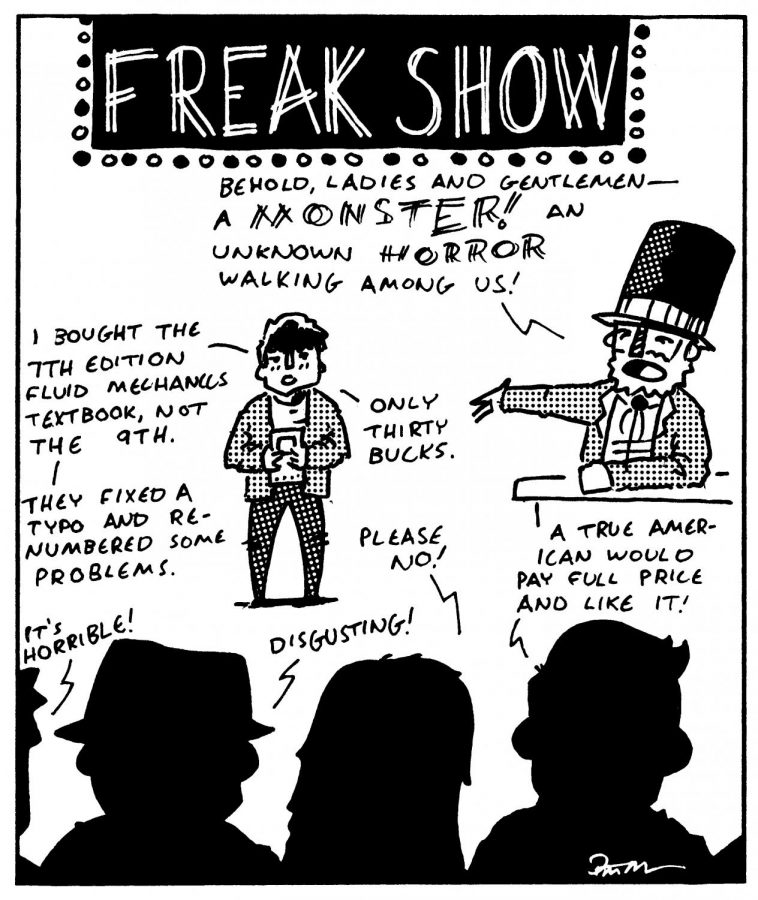Op-ed: Textbook prices impose a heavy burden on students
Textbook publishers burden students by issuing new editions of similar textbooks.
October 2, 2019
When most people consider the costs of their higher education, they usually think of tuition, housing and their source of food. Textbooks are yet another cost that must be considered. They might seem substantially insignificant compared to those larger expenses, but textbook prices impose a sizable additional cost on students every semester.
According to the National Center for Education Statistics, the average annual cost for books and supplies for Northeastern students during the 2017-18 academic year was a whopping $1,000. Many students struggle to afford the cost of these materials on top of their tuition. Even with the option to rent textbooks or purchase them used, many college students consistently find the cost overwhelming.
As if being a college student isn’t already taxing enough, publishers increase that burden by consistently issuing new editions of the same textbooks, requiring software to accompany the books or monopolizing subject areas — all to drive up prices. As a result, students are often forced to seek out alternative methods to acquire textbooks. Whether it’s e-books, PDFs, photocopies or even piracy, students are driven to find another way.
To make matters worse for some, students in STEM fields are more heavily impacted by expensive textbooks. According to a 2015 study conducted by Priceonomics in which they assessed the University of Virginia’s textbook list, they concluded, “there are certain majors for which the textbooks in the average class costs four times the amount of the least expensive ones.” The more costly subjects tend to be in STEM, and while the disparity is partially due to the ever-changing nature of these fields, there is no reason a student should be financially penalized for their choice of major.
It is also important to account for students that come from different economic backgrounds. As an international student myself, I am already subject to extra costs that domestic students are not, such as for visas and the one-time international student fee. Fortunately, as a journalism and theatre double major my textbooks are relatively cheaper; but what about an international student in a STEM-related field or a low-income domestic student? These students already sacrifice so much — why should their education be further compromised by something that can be avoided?
Like many students, my parents are currently paying for my education. Even though they willingly take on this expense, I still feel guilty about spending their hard-earned money on ridiculously expensive textbooks that I only use for one semester. I know that time and effort has gone into every single one of those pages and I do believe that the authors and publishers deserve their credit. However, many students are forced to seek out versions of their books for free, illegally or at discounted prices simply because they cannot afford them.
Due to the cost of textbooks, some students choose to take courses without buying them at all. According to a 2014 U.S. Public Interest Research Group survey, 65 percent of college students refused to buy their required textbooks due to high prices, and 94 percent of those students were concerned that their grades would suffer as a result. These statistics are telling in how students’ grades could be jeopardized due to their financial inability to buy textbooks, and it shows that the current system is discriminatory against those who cannot easily afford their textbooks.
While the onus falls on the school’s administration, we should also look at the professors’ role in this matter. Professors should consider the cost of textbooks when choosing materials for their courses, as many of them understand the financial burden of pursuing a college education in the United States. Having said that, I personally think professors should strive to teach their course in such a way that students aren’t struggling to buy textbooks. The internet is at our fingertips. Professors can just as easily assign readings from websites, articles, open textbooks, or journals (all of which are free for the most part). Since most professors don’t cover the entire textbook, they can save students money by photocopying portions of it. It is perfectly legal for a professor to distribute copies for teaching purposes. A little extra effort can go a long way for a student who can’t afford textbooks.
I believe it is Northeastern’s responsibility to ensure that every student has guaranteed access to textbooks without having to empty their wallets. Northeastern could offer a program for those who can’t afford textbooks, similar to how Swipe2Care helps students find meals. One possible initiative could be a book swap, allowing students who have taken the same courses to exchange their books at no cost. Perhaps Northeastern can absorb some of the costs of more expensive books to ensure the average cost of books is relatively equal across majors. Just this week, SGA issued a notice that they are beginning an initiative to reduce textbook costs, as well as urging professors to use open education resources. As students, we must hold them accountable to this. Whatever the potential solution, one thing remains undisputed — your financial situation has no right to dictate your potential to receive a stellar collegiate education.
Pavithra Rajesh is a first-year journalism and theatre double major.







